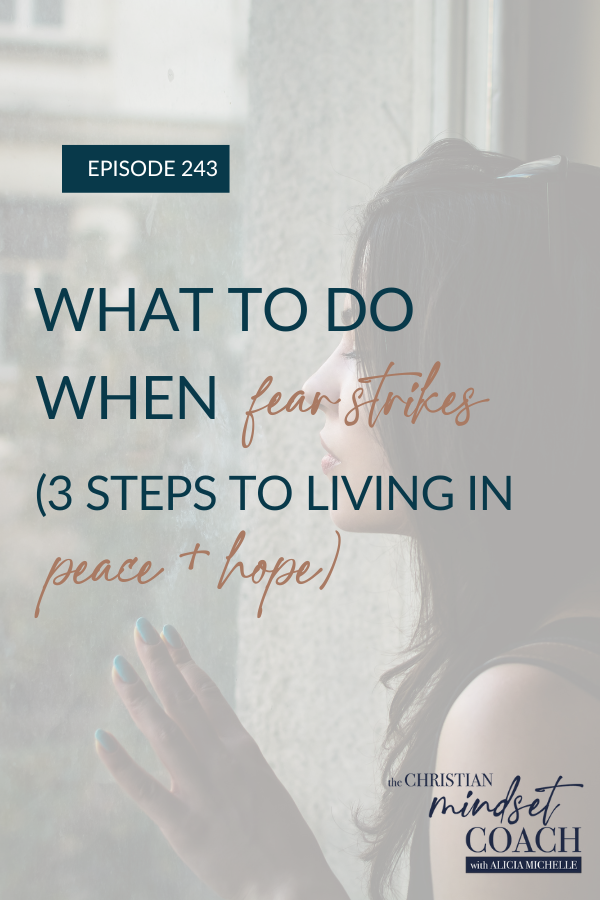When anxious thoughts strike, many of us start to develop a fear of the future. In this episode, you will learn 3 steps you can take to turn your fearful thoughts and anxiety into healthy coping strategies for managing fear and bringing more peace and hope in your day-to-day life.

WHAT YOU’LL LEARN:
- [02:06] How can we have compassion (instead of condemnation) for fear?
- [05:24] Changing worldly fear into godly fear
- [11:55] Where are we emotionally dwelling?
- [15:25] Developing healthy anxiety coping strategies + your anxiety management plan
[02:06] How can we have compassion for fear?
When we are faced with fear, the first thing we need to do is to have compassion and understanding for ourselves. People often feel like they want to kick fear out and tell it to go away but our souls are not black-and-white engines. We cannot shut fear down because when we do, we are suppressing it and it is not going to just go away,
One of the most powerful things we can do with any tough emotion is to take the first step and face it with compassion. We have to live as God does and just like Psalm 103:13-14 says “As a father has compassion on his children, so the Lord has compassion on those who fear him; for he knows how we are formed, he remembers that we are dust.” We must rely on God’s compassion for us. Being able to address our fears and tell ourselves “I understand why you feel like that,” can go a long way.
Matthew 11:28 says, “Come to me, all you who are weary and burdened, and I will give you rest.” He does not say that we need to walk away from Him and go deal with these things ourselves, right? He has compassion and love for all of us. He wants to comfort and help us. The enemy wants us to push down our fears and shame ourselves for them. God, on the other hand, wants us to acknowledge it with Him and begin to work through it with love.
[05:24] Changing worldly fear into godly fear
After we have had compassion and understanding of what is there, we can discern what is going on. We can ask ourselves “What part of this is true and what part of this is something that I have elevated and pushed beyond what it really is?” There are times when things feel very frightening and we have to ask ourselves, after we acknowledge it and have compassion for it, where can I change this worldly fear into godly fear? This starts by noticing what words are there and science has proven that our thoughts and words are creating chemical changes in our bodies in a given moment. This is why it is so important that we have a discernment of what we are thinking and feeling.
We need to acknowledge the present moment's significance and maintain a steady intake of truth in our lives. The power lies within us to choose what we feed our minds and which voices we allow to influence us. Many of us are still tethered to voices from the past, whether it is a fourth-grade friend, an 11th-grade teacher, or our parent's expectations. We can decide whether to perpetuate their narratives or choose a new one. We also have the authority to discern between genuine fears and self-imposed burdens. We can start to understand the difference without judgment and actively shape the contents of our minds.
Implementing boundaries and limitations is so important as well. We have to make sure that we are guarding against negative influences that perpetuate fear whether it is from other people, social media, or overwhelming news channels. We must proactively filter what enters our minds.
John 6:63 says, “The Spirit gives life; the flesh counts for nothing. The words I have spoken to you—they are full of the Spirit and life” Jesus’s words are life and there is a difference between life and death in our words.
Proverbs 10:11 says, “The words of the godly are a life-giving fountain; the words of the wicked conceal violent intentions.” We need to ask ourselves: what are the words we are feeding ourselves and what are we going to end up holding onto as a part of listening to them?
[11:55] Where are we emotionally dwelling?
We get to choose how we respond to challenges. We hold the power to decide whether we remain entangled in worldly fear or transition to a state of godly fear. I call this step “deciding where to emotionally dwell”. We have seen the fear, the reason for the fear, and now we see the truth. Then we get to decide what we are going to do with these feelings. Are we going to have the confidence to hold God's hand and jump across that chasm to godly fear or are we going to stay stuck in worldly fear? We get to decide where to stay, where to rest, and where to dwell.
David is such a good example of that. He acknowledges everything that he is feeling, then he reminds himself of the truth, and then he decides where he is going to dwell. There are a few scriptures that can help you with this concept:
Psalm 62:1-2 says, “I wait quietly, before God, for my victory comes from him. He alone is my rock and my salvation, my fortress, where I will never be shaken.” God is a refuge for us but we have to choose whether or not we are going to trust in Him. This is an active decision that we have to make.
Psalm 63:6-8 says “I lie awake thinking of you, meditating on you through the night. Because you are my helper, I sing for joy in the shadow of your wings. I cling to you; your strong right-hand holds me securely.” This is what is happening in this third step, we get to choose where to go and we can rely on God for support.
Another verse that is great when you need to work through fear is Isaiah 26:3 which says “You will keep in perfect peace all who trust in you, all whose thoughts are fixed on you!” This can help you to focus on God and bring you perfect peace.
[15:25] Developing healthy anxiety coping strategies + your anxiety management plan
During the peak of my struggle with anxiety, I often received comfort from scriptures shared by others. While these were powerful I could not escape the realization that a deeper issue was still there, fueling my fear. I needed a plan to get to the true root of this fear and go beyond temporary fixes. I not diminishing the power of the Word of God, I am acknowledging that some of us grapple with deeper issues and when we have surface-level fixes, it can lead us to frustration, possibly even with God, as we wonder why meditation on scripture or positive thoughts does not seem to fully alleviate our anxiety.
The challenge I was given by God was to dig deeper, and now I am extending that to you. What is the underlying issue that God is drawing attention to and how can we work towards true healing rather than just trying to temporarily alleviate the symptoms?
If you are looking for a personalized anxiety management plan – a way to identify triggers and employ calming strategies tailored to what works for you then I encourage you to check out the Calm Your Anxiety Tool Kit. This toolkit includes a Bible study, suggests healthy coping strategies, helps uncover the root causes, and provides affirmation statements. This will help you form a comprehensive plan to break free from the perpetual cycle of fear and anxiety. This is the same toolkit that has helped me along the way so I would encourage you to check out the Calm Your Anxiety Tool Kit to create your custom plan to manage your anxious thoughts.
163: How I Take Courage, Manage Anxiety, and Release Fear with Amy Debrucque
201: It's Time to Make a Plan to Manage Anxiety, Release Fear and Stop Worry

